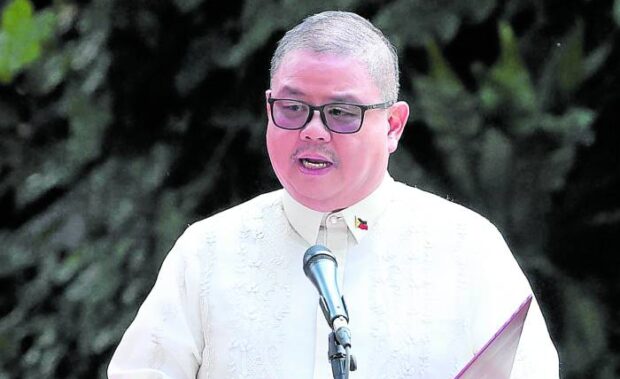DA must be ‘data-driven’ to curb cycles of glut, scarcity

Agriculture Secretary Francisco Tiu Laurel (File. photo by MARIANNE BERMUDEZ / Philippine Daily Inquirer)
MANILA, Philippines — President Ferdinand Marcos Jr. on Tuesday ordered the Department of Agriculture (DA) to develop a “data-driven information system” for every planting season to address the overproduction of agricultural products in the market, according to the Presidential Communications Office.
In a press briefing, Agriculture Secretary Francisco Tiu Laurel Jr. admitted the government still lacked the necessary data to use as a basis for its programs, such as the peso value of excess agricultural products lost to wastage.
“Well, as for the study of the statistics, that has really been my problem from the start. As I have already said in my first-ever presscon, we actually don’t have the data to quantify the total [amount of losses],” he told reporters.
While Laurel lamented the lack of official government data on the losses due to oversupply, he said that based on his firsthand experience, the agricultural sector usually suffers a 30-percent loss in income due to wastage from the lack of facilities along the supply chain.
The DA chief said he was surprised to get the same data after talking with a farmer from Benguet on Friday at the Food Terminal Inc. (FTI) trading complex in Taguig.
“I was surprised that he said the same thing that was on my mind when I asked, ‘How much of your produce is lost [to wastage] as it reaches Metro Manila markets?’ He answered ‘one ton, roughly 30 percent,’” Laurel said.
A data-driven agricultural system can also prevent the frequent shortages in commodities such as rice, sugar, meat, garlic, and onion that have affected Filipino consumers.
3-year food security plan
Laurel and other DA officials met with President Marcos in Malacañang on Tuesday morning to present the agency’s three-year plan for the country’s agricultural sector, with the main thrust of ensuring food security.
The “Para sa Masaganang Bagong Pilipinas” program, according to Laurel, included digitalization aimed at uplifting the agri-fisheries sector by equipping decision-makers, farmers, food producers, and consumers with accessible technology and advanced tools.
During the meeting, the President told agriculture officials that farmers should be equipped with the “necessary information” to limit their production of agricultural products to those that could be sold in the market.
“It’s another part of data-driven decisions that we give to the farmers, the producers — on what is marketable at this time, this season,” he said.
“This way, we will no longer be hearing the news that our farmers have over-produced or that they cannot sell their produce and have just either allowed it to rot or given it away,” the President added.
DA officials agreed, saying that with “accurate, real-time data, stakeholders can make smarter, data-driven decisions and efficiently manage emergencies and day-to-day operations.”
The World Bank earlier noted that improving the collection and use of data and harnessing the power of digital tools would enable small farmers to increase efficiency and promote equity, pointing out that data-driven digital agriculture would improve crop yields, reduce waste, support transparent pricing, lower costs, and strengthen farm resilience, among others.
No cash aid
Aside from causing losses to farmers, the problem of overproduction is also straining the government’s resources, and Laurel projected that the DA would be able to provide a solution to the vegetable glut only “in 13 to 14 months” with the establishment of more cold storage facilities.
Laurel admitted that the DA lacked the immediate response to help farmers deal with the current oversupply of vegetables and crop pests.
“As of now, we have no aid for [our farmers] because technically there’s no fund to help them,” he said, referring to farmers who were reported to have been throwing away their produce due to overproduction.
The DA chief clarified that they have drawn up a list of possible interventions that would help farmers, but these would not involve the giving of financial aid.
“As much as possible, we are trying to find ways to help them, of course. I think that is the job of the government. But as of the moment, our team at the DA’s trying to figure out what we can give them, and as far as cash ayuda (aid) is concerned, I am actually not a believer in that,” he said.
“I’d rather give [them] farm implements [such as] seeds, fertilizer, or something else. But definitely, we will try our best to help because that’s our mandate,” Laurel added.
He expressed optimism that the planned establishment of cold storage facilities to add more Kadiwa stores would help address the problem farmers face when they have excess produce.
“Whenever we have incidents like that, it’s either the farmers store their excess production—and that’s subsidized by the government—or it could be arranged that the government buys those excess products at a certain price to be distributed through Kadiwa,” he said.
But even with the planned interventions, Laurel was cautious about making projections on the impact that these would have on the country’s food security, such as lowering the cost of rice.
“The price of rice depends on the world market. But assuming everything is stable and the country would not be hit by calamities or all of that, hopefully, at least that would cause a 5-percent reduction in prices,” he said.
The P20-a-kilo rice, which was a campaign promise of President Marcos, remains “an aspiration, a target,” Laurel noted.
He also called on local government units to help solve the oversupply problem as part of their devolved functions and their personnel guiding farmers in planning their production.
The DA also aims to create more water-impounding facilities and set up solar-powered irrigation systems to help mitigate the impact of the oncoming El Niño phenomenon.